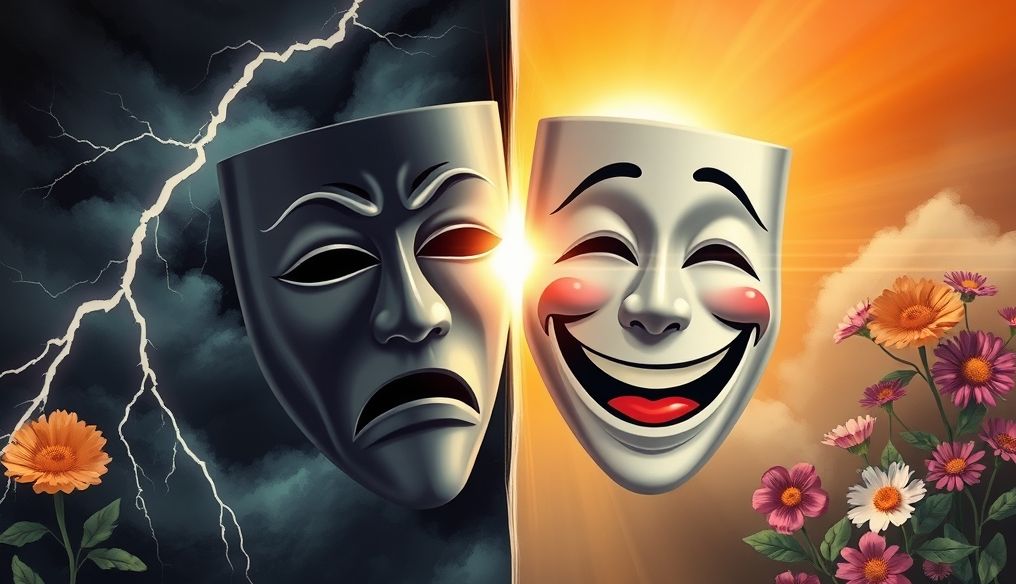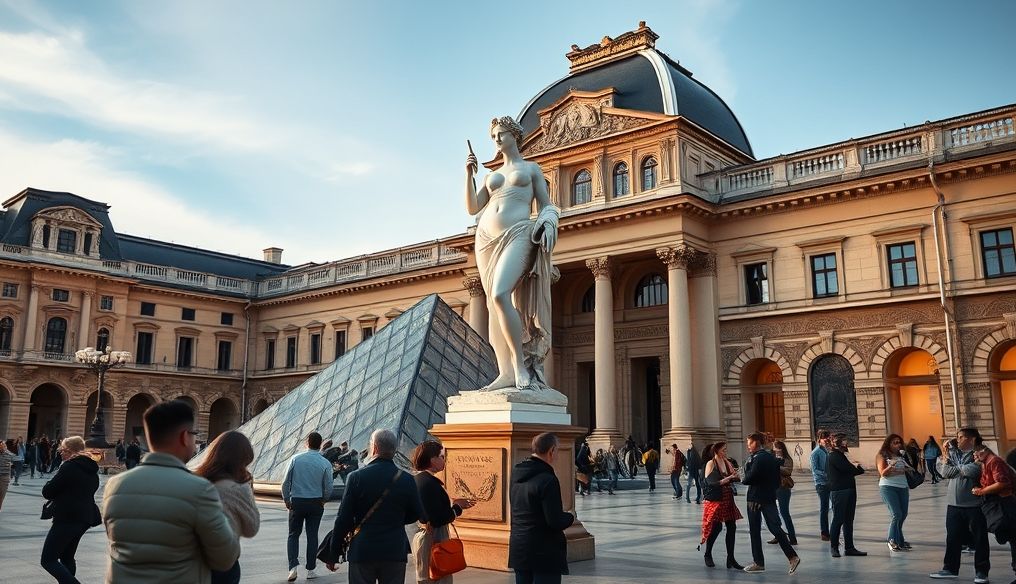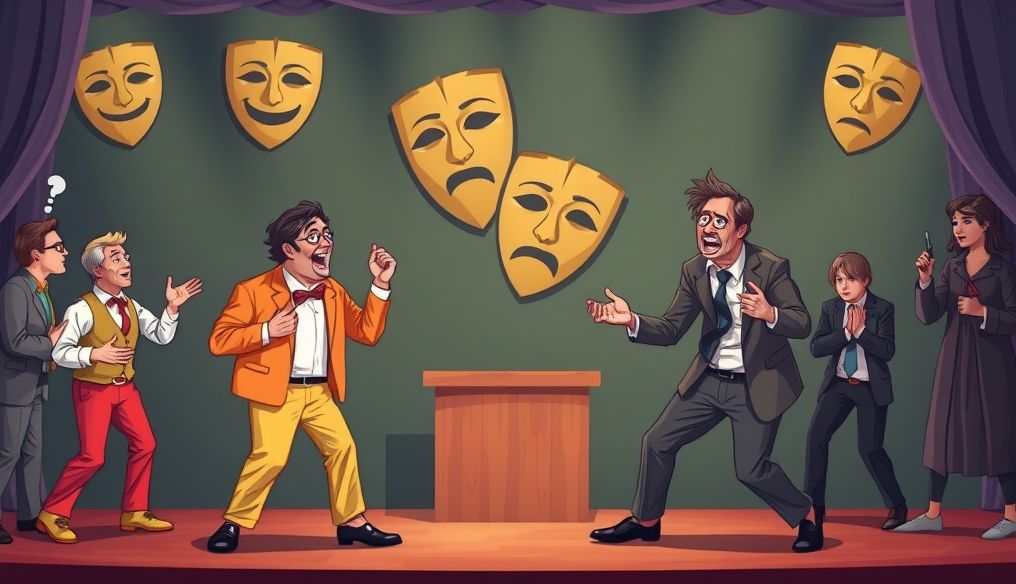What are the Different Types of Plays (Comedy, Tragedy) and How Have They Evolved Throughout History?
Theater, as a performing art, has always been a mirror reflecting society and its issues, and exploring the depths of the human psyche. Among the various theatrical genres, comedy and tragedy stand out as the most influential and famous. This article provides a comprehensive overview of these two genres, tracing their evolution throughout history.
1. Tragedy: Its Origins and Evolution
1.1. The Greek Origin of Tragedy
The roots of tragedy go back to ancient Greece, where it originated as part of religious rituals dedicated to the god Dionysus, the god of wine and fertility. Early tragic performances were simple, consisting of a chorus singing and dancing, which then evolved to include one or two actors interacting with the chorus.
Key characteristics of Greek tragedy:
- Themes: Greek tragedy often drew its stories from myths and historical events, addressing issues such as fate, justice, and revenge.
- Characters: Main characters are usually noble or of high social standing, suffering from internal and external conflicts that lead to their tragic downfall.
- Catastrophe: The catastrophe or tragic ending is a fundamental element of tragedy, where the hero dies or suffers greatly.
- Catharsis: Tragedy aims to evoke feelings of fear and pity in the audience, leading to their purification from these emotions.
1.2. Prominent Greek Tragedy Writers
Among the most famous Greek tragedy writers:
- Aeschylus: Considered the father of Greek tragedy, he introduced the second actor to the play. One of his most famous works is "Prometheus Bound."
- Sophocles: Added the third actor and focused on human conflict. His most famous works include "Oedipus Rex" and "Antigone."
- Euripides: Distinguished by his realistic style and complex characters. His most famous works include "Medea" and "Electra."
1.3. Roman Tragedy
The Romans were influenced by Greek tragedy but added some changes. Roman tragedy focused more on violence and excitement and reduced the importance of the chorus. Seneca is one of the most famous Roman tragedy writers.
1.4. Tragedy in the Renaissance
The Renaissance witnessed a revival of interest in classical tragedy. Playwrights drew inspiration from Greek and Roman tragedies but added new elements. William Shakespeare, who wrote tragedies such as "Hamlet," "Othello," and "King Lear," is one of the most famous tragedy writers of the Renaissance.
1.5. Modern Tragedy
In modern times, tragedy has taken on new forms. Modern tragedy is no longer limited to noble characters but deals with the lives and suffering of ordinary people. Arthur Miller, who wrote the play "Death of a Salesman," is one of the most famous modern tragedy writers.
2. Comedy: Its Origins and Evolution
2.1. The Greek Origin of Comedy
Comedy also originated in ancient Greece as part of religious rituals dedicated to the god Dionysus. Early comedic performances were humorous and farcical, often dealing with political and social issues.
Key characteristics of Greek comedy:
- Themes: Greek comedy often dealt with contemporary topics, criticizing politicians and prominent figures in society.
- Characters: Comedic characters are usually stereotypical and exaggerated, characterized by stupidity, greed, and vanity.
- Plot: The comedic plot is often complex and full of surprises and twists.
- Happy Ending: Comedy usually ends with a happy ending, where the heroes get married or solve their problems.
2.2. Prominent Greek Comedy Writers
Among the most famous Greek comedy writers is Aristophanes, who wrote plays such as "The Clouds," "The Birds," and "Lysistrata."
2.3. Roman Comedy
The Romans were influenced by Greek comedy but added some changes. Roman comedy focused more on vulgar humor and comical situations. Plautus and Terence are among the most famous Roman comedy writers.
2.4. Comedy in the Renaissance
The Renaissance witnessed a revival of interest in classical comedy. Playwrights drew inspiration from Greek and Roman comedies but added new elements. William Shakespeare, who wrote comedies such as "A Midsummer Night's Dream," "Much Ado About Nothing," and "Twelfth Night," is one of the most famous comedy writers of the Renaissance.
2.5. Modern Comedy
In modern times, comedy has taken on new forms. Modern comedy is no longer limited to farcical humor but deals with serious and complex topics. Black comedy and romantic comedy are among the most famous types of modern comedy.
3. Comparison Between Comedy and Tragedy
Despite their differences, comedy and tragedy share some characteristics. Both are forms of drama, and both aim to evoke emotions in the audience. However, comedy and tragedy differ in their goals and outcomes.
| Property | Tragedy | Comedy |
|---|---|---|
| Goal | To evoke feelings of fear and pity, and to purify the audience from these emotions | To evoke laughter and joy, and to provide entertainment for the audience |
| Characters | Usually noble or of high social standing, suffering from internal and external conflicts | Usually stereotypical and exaggerated, characterized by stupidity, greed, and vanity |
| Plot | Usually complex and full of conflicts and surprises | Usually complex and full of surprises and twists |
| Ending | Usually tragic, where the hero dies or suffers greatly | Usually happy, where the heroes get married or solve their problems |
4. Other Types of Plays
In addition to comedy and tragedy, there are other types of plays, such as:
- Drama: Drama deals with serious topics but does not always end with a tragic ending.
- Farce: Farce relies on slapstick humor and exaggerated situations.
- Melodrama: Melodrama focuses on evoking emotions in the audience and often deals with emotional topics.
- Musical: A musical combines drama, music, singing, and dancing.
5. The Importance of Theater
Theater plays an important role in society. It provides entertainment for the audience, reflects society and its issues, and explores the depths of the human psyche. Theater can inspire people and motivate them to think and change.
6. Theater in the Arab World
The history of theater in the Arab world dates back to the 19th century when European theater companies began performing in major Arab cities. Arab theater gradually developed and became distinctive. Tawfiq al-Hakim and Saadallah Wannous are among the most famous Arab playwrights.
7. The Future of Theater
Theater in modern times faces new challenges, such as competition from other media. However, theater remains popular and is likely to continue playing an important role in society in the future.
8. Tips for Watching Plays
If you want to watch a play, here are some tips:
- Choose a play that suits your taste: There are many different types of plays, so look for a play that deals with a topic that interests you.
- Read about the play before watching it: This will help you understand the story and the characters.
- Prepare for a unique experience: Theater is a live experience, so relax and enjoy the show.
- Discuss the play with others after watching it: This will help you understand the play better.
In conclusion, comedy and tragedy are two fundamental types of plays, each with a long history and a profound impact on human culture. By understanding these different genres, we can better appreciate theater and enjoy a richer viewing experience.




